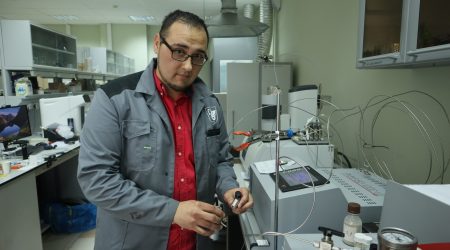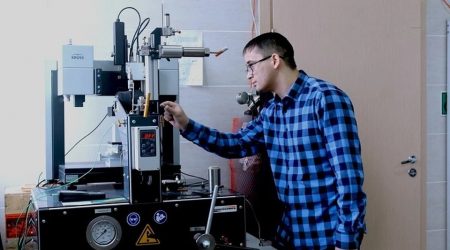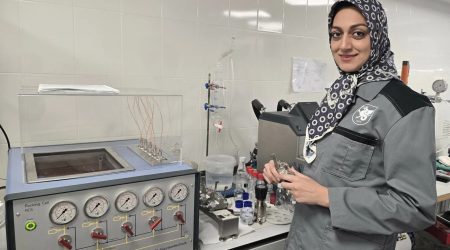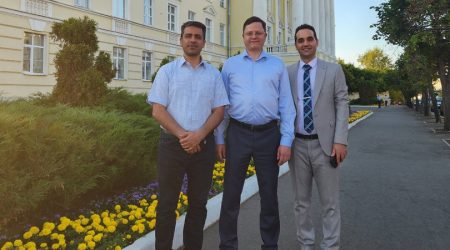First in the world monograph on catalytic underground oil refining published by Kazan Federal University
A press briefing was held on 10 August at Tatar-Inform agency.
The briefing featured Vice-Rector for Earth Sciences Danis Nurgaliev, General Director of Tatarstan Petroleum Chemistry Investment Holding Rafinat Yarullin, and co-authors of the book, Chair of the Department of Petroleum Engineering Mikhail Varfolomeev, Invited Professor Jorge Ancheyta, Senior Research Associate Irek Mukhamatdinov, and Senior Research Associate Jose Guillermo Felix Lugo. Director of Topchiev Institute of Petrochemical Synthesis (Russian Academy of Sciences) Anton Maksimov joined via video conference.
KFU is one of the global leaders in underground refining. Governmental grants and Zarubezhneft, KFU’s industrial partner, help in advancing cutting-edge laboratory research. This year, Irek Mukhamatdinov received Russian Presidential Award for Science and Innovation for his work in this area. An idea of a monograph summarizing recent developments then came up.
“This monograph is the first in the world covering underground oil refining. Many companies use this tech to irreversibly alter oil viscosity. Tatneft, Ritek, Lukoil, and Zarubezhneft use it to recover ultra-viscous oil,” said Dr Nurgaliev.
Jorge Ancheyta talked about his involvement, dating back to 2018, “At a conference on heavy oil production, we met representatives of Kazan University and began to cooperate. The issue of heavy oil production is very important for Russia, Mexico and other countries, not only in terms of economics, but also in terms of technology efficiency for the whole world. The idea was that we use steam injection, plus catalyst-added technology, and in this way we increase efficiency, we can produce more oil.”
Mikhail Varfolomeev further commented on the book’s contents, “We managed to build a chain from the chapters on oil properties and structure to the chapters on modeling, digital methods, which allow us to understand what and how things happen, to the technological aspects. We looked in detail at all the methods that exist today for heavy oil extraction. We showed the advantages that underground catalytic refining technology has. We reduce resource inputs, increase the technological effect, and solve environmental problems because catalytic aquathermolysis technology allows us to use less steam. In this book, we have shown how digital technology can be used to study in detail first the behavior of these catalysts at the molecular atomic level, then move on to how it behaves in the rock, and finally to model the application of these technologies to other fields.”
He said that the book was funded by Russian Science Foundation, and the first technology testing was held in Tatarstan by Tatneft.
Jose Guillermo Felix Lugo said about one of the chapters on heavy oil, “We have shown examples of these properties for oil that has been collected from around the world, and how they differ from each other. In the next chapter, we described what catalysts are used for this technology underground for in-situ refining of heavy oil. One important problem why heavy oil is difficult to extract is viscosity. Catalysts can irreversibly reduce the viscosity in a reservoir – with economic and technological benefits.”
Irek Mukhamatdinov noted the many further opportunities to study the influence of catalysts, “Various instrumental methods and approaches are used: electron paramagnetic resonance spectroscopy, nuclear magnetic resonance spectroscopy, and calculation of spectral coefficients. They make it possible to dig deeper and study in more detail both the oil itself and the fractions before and after transformation, to clarify the fundamental basis of in-situ refining.”
Rafinat Yarullin called the monograph marvelous, “Making oil more liquid is an important task. Such a comprehensive work has been undertaken for the first, and it’s great to see overseas experts and young scientists involved in this. I think the book should become a permanent presence on students’ desktops. The topic is big and complex.”
The participants reminisced on the fine work by the late science popularizer, Associate Professor Arkady Kuramshin (1970 – 2019), author of such books as The Life of Remarkable Devices, The Life of Remarkable Compounds, and The Elements: A Remarkable Dream of Professor Mendeleev.
In the future, the technologies of underground catalytic refining of heavy and extra-heavy crude oil may become one of the important tools for the development of the oil and gas industry, and this book will help professionals, scientists, undergraduate and graduate students all over the world to understand the main aspects and mechanisms of underground partial refining of crude oil using catalysts and the possibilities of its application in practice.














